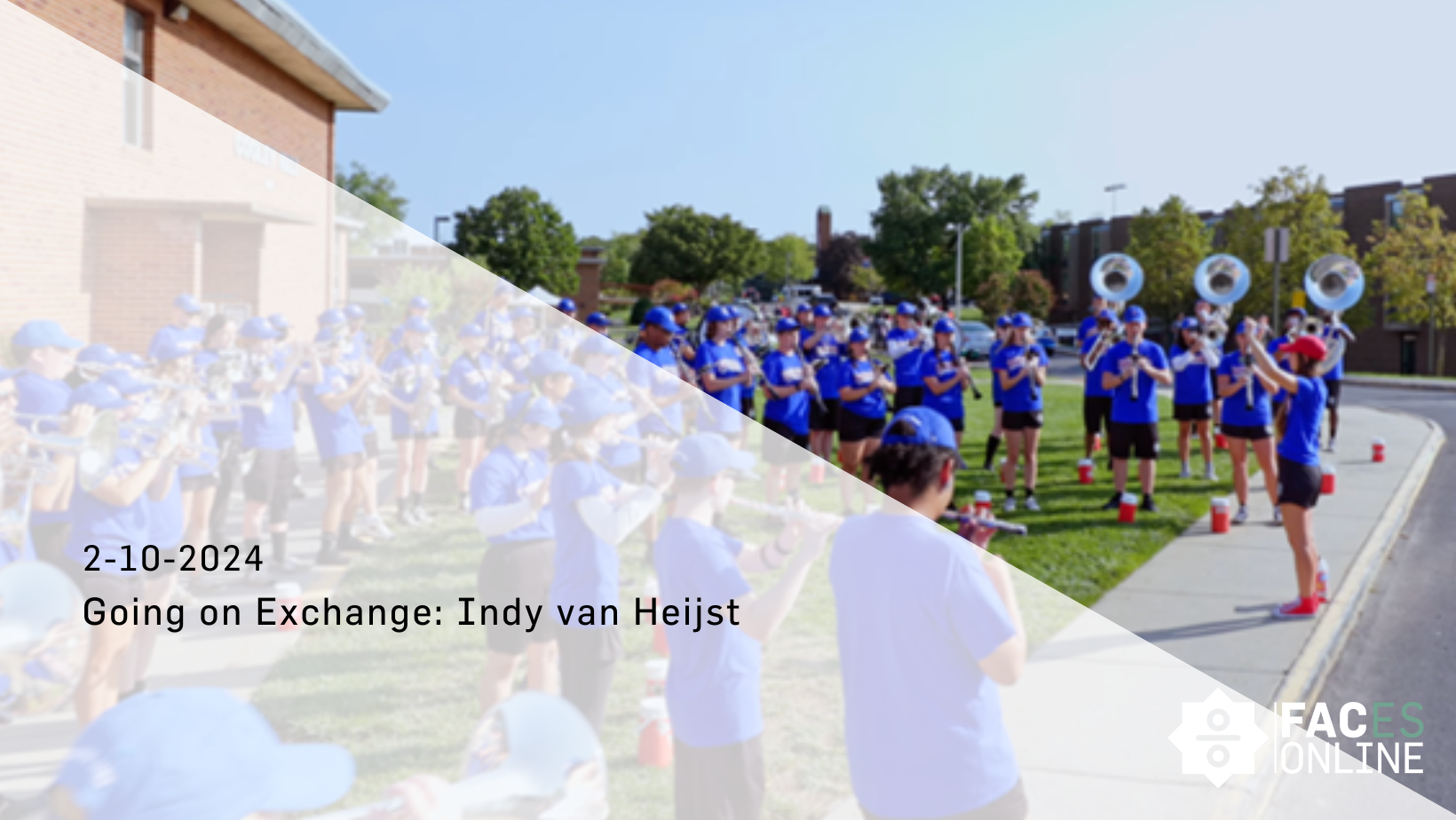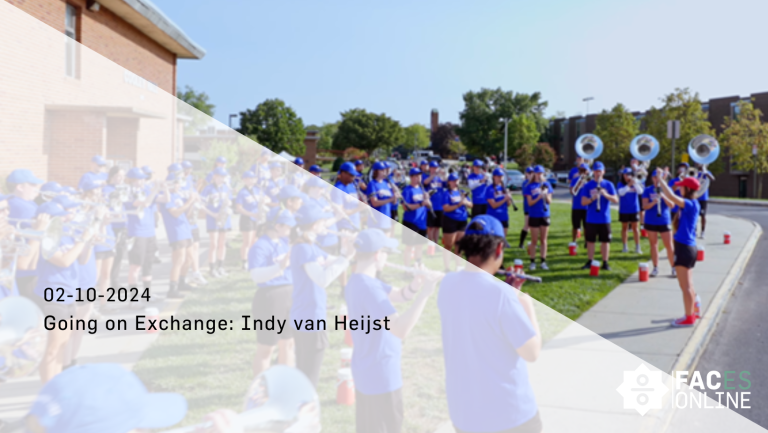For this week’s interview in Faces, we had the opportunity to speak with Indy van Heijst, a 23-year-old master’s student in Accountancy from the Netherlands. Indy is currently spending a semester abroad at Shenandoah University, a small institution located in Winchester, Virginia, just 1.5 hours from Washington, D.C.
Motivated by her curiosity about American universities, Indy decided to add this semester abroad to her program through ISEP, an organization that connects students with global study opportunities. Despite some initial challenges, such as transitioning to online classes and adjusting to the campus culture, Indy is embracing the American experience and looking forward to exploring the U.S. during her stay. Read on as she shares insights into student life in America, cultural differences, and her travel plans.
How does university life in the USA differ from what you experienced in the Netherlands?
Perhaps due to its size, with approximately 4,000 students, Shenandoah University offers a unique academic environment characterized by small class sizes. All of my classes accommodate a maximum of 15 students, and attendance is mandatory for all lectures.
Another change I have experienced is the prevalence of numerous small assignments. While at Tilburg University I typically had one final exam and one group project, at Shenandoah University I have almost weekly quizzes and assignments for each course.
Additionally, as previously mentioned, I reside on campus in dormitory accommodations. One notable difference from the Netherlands is that I share a room with another person, which is an integral aspect of the American university experience. Luckily, my roommate is very nice and we have already bonded. I also have a meal plan that includes 18 meals per week, which allows me to enjoy meals in the dining hall or at three small restaurants on campus—Moe’s Southwest Grill, The Spread, and Bento Sushi—where I can order food.
What has been your favorite aspect of studying in the USA so far?
Especially interesting to see was the official moving-in date. As international students, we arrived on campus earlier than the majority of students due to two additional orientation days that provided information about the university, our visas, and various other topics. On the official move-in day, student-athletes assisted the incoming freshmen with their belongings, creating a welcoming environment. Additionally, the marching band and cheerleaders were present, contributing to a vibrant atmosphere with their performances.
How do you find the academic workload compared to your university back home?
Thus far, I find the academic difficulty to be lower compared to Tilburg University. While the overall workload may be slightly higher due to the numerous weekly assignments, the complexity of the material is noticeably less challenging. Additionally, I expect that the workload at the end of the semester will be lighter compared to what I experience at home, particularly since not all courses conclude with a final exam.
What aspects of American culture have you found most surprising or interesting?
Many aspects of American culture have aligned with my expectations. For example, the presence of the marching band and the prominence of athletes on campus are very much part of the experience. Additionally, most students dress quite casually. It’s common to see athletes wearing sports attire or t-shirts representing their respective sports. And don’t be surprised to see people wearing pajamas on campus. Especially in the dining hall when getting food.
The most surprising thing is that there is not really a drinking culture at this university. Since the legal drinking age in the U.S. is 21, all university-sponsored activities are alcohol-free. In my opinion, as well as that of a few other European students, this made some of the orientation activities feel somewhat bland or less engaging.
This is the downside of studying at a small university, because I would have loved to see and experience how that is. Moreover, there aren’t really any clubs or good bars in this town. Additionally, the town itself lacks vibrant nightlife, with very few clubs or bars available.
What challenges have you faced while adapting to life in the USA?
The biggest challenge I have encountered is meeting new people. So far, I have primarily connected with other international students, as they tend to be more open and approachable compared to American students.
I was also somewhat unfortunate in that all of my classes were transitioned to an online format. Due to low enrollment in the face-to-face versions—typically only two or three students—professors opted to conduct the courses entirely online. This has made it more difficult to engage with others and build connections. However, this issue seems specific to MBA courses, where many students are slightly older and working full-time. For the four other exchange students taking undergraduate courses at the university, all classes are still held on campus.
Fortunately, the university organizes several weekly activities, including shopping trips, hiking excursions, yoga, dance classes, and more. These events provide some opportunities to meet new people and foster connections.
What skills or lessons have you learned that you didn’t expect to gain from this experience?
One thing I’ve come to appreciate more is the public transportation and infrastructure in the Netherlands. In Winchester, commuting is quite challenging. It is evident that America is designed with car ownership in mind. There are few footpaths, and in some areas, they abruptly stop, making it difficult to walk to places like grocery stores or shops.
For example, while there is a gas station nearby, the closest grocery store is a 20- to 25-minute walk. Additionally, most stores here are surrounded by large parking lots, which means you have to navigate through several of them when moving from shop to shop. This makes getting around without a car quite inconvenient.
Luckily, since I have a meal plan, I don’t really need to buy a lot of things.
Have you had any moments of homesickness? How did you cope with that?
I did have a brief moment of regret after arriving. This feeling was mainly due to the fact that most of my classes started later than others, leaving me with about a week and a half without much to do. Since many of the other students were already attending lectures, completing assignments, and staying busy, I felt somewhat isolated.
To cope with this, I reminded myself of the reasons I chose to come to the United States. In addition to experiencing American university culture, one of my primary goals was to travel extensively. During that downtime, I focused on planning my upcoming trips. As a result, I am now very excited about visiting New York, Las Vegas (and the surrounding National Parks), and Los Angeles.
One advantage of having online classes is that it allows me the flexibility to travel during the semester.
What advice would you give to other Dutch students considering studying in the USA?
First and foremost, I would recommend considering the size of the university. I genuinely believe that attending a larger institution would offer a more vibrant and engaging experience, especially if you are looking to fully immerse yourself in American university culture, including aspects like sororities and fraternities.
Secondly, thoroughly research the university’s location. While my university is situated just 1.5 hours from Washington, D.C., commuting into the city is not straightforward.
Without access to a car, your only option is to take a taxi, as the nearest public transportation that connects to D.C. is still about an hour away.
Lastly, if you fancy a drink every now and then, and you are under 21, you may want to carefully consider studying in the United States. While I have not yet experienced how strictly IDs or passports are checked at clubs, since there are none nearby, I can confirm that our IDs were checked at grocery stores and gas stations. This makes it a bit more restrictive compared to the Netherlands.

















